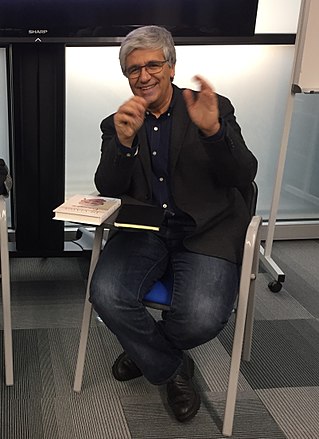
Umberto Eco was an Italian medievalist, philosopher, semiotician, novelist, cultural critic, and political and social commentator. In English, he is best known for his popular 1980 novel The Name of the Rose, a historical mystery combining semiotics in fiction with biblical analysis, medieval studies and literary theory, as well as Foucault's Pendulum, his 1988 novel which touches on similar themes.

Emanuele Severino was an Italian philosopher.

Niccolò Ammaniti is an Italian writer, winner of the Premio Strega in 2007 for As God Commands. He became noted in 2001 with the publication of I'm Not Scared, a novel which was later made into a movie directed by Gabriele Salvatores.

Vasco Rossi, also known mononymously as Vasco or with the nickname Il Blasco, is an Italian singer-songwriter and poet. He has published 30 albums and written over 250 songs, as well as lyrics for other artists.

Juan Gómez-Jurado is a Spanish journalist and author. He is a columnist in "La Voz de Galicia" and "ABC", distributed in Spain, and he participates in multiple radio and TV programs. His books have been translated into 42 languages and he is one of the most successful living Spanish authors, along with Javier Sierra and Carlos Ruiz Zafón. His writing has been described by critics as "energetic and cinematographic".

Luigi Meneghello was an Italian contemporary writer and scholar.

The Trentino Tyrolean Autonomist Party is a regionalist, autonomist, Christian-democratic and centrist political party in Trentino, Italy. The PATT, heir of the Trentino Tyrolean People's Party, is the unofficial counterpart of the South Tyrolean People's Party (SVP), active in South Tyrol. The two are members of the European People's Party (EPP) and usually contest general and European Parliament elections together. Simone Marchiori is the party's current secretary, while former senator Franco Panizza serves at its president. The PATT has led the provincial government with Carlo Andreotti in 1994–1999 and Ugo Rossi in 2013–2018, as well as the regional government with Andreotti in 2002–2004 and again with Rossi in 2014–2016.

Luigi Comencini was an Italian film director. Together with Dino Risi, Ettore Scola and Mario Monicelli, he was considered among the masters of the "commedia all'italiana" genre.

Mario Soldati was an Italian writer and film director. In 1954, he won the Strega Prize for Lettere da Capri. He directed several works adapted from novels, and worked with leading Italian actresses, such as Sophia Loren and Gina Lollobrigida.

Ippolito Nievo was an Italian writer, journalist and patriot. His Confessions of an Italian is widely considered the most important novel about the Italian Risorgimento.

Giuseppe Berto was an Italian writer and screenwriter. He is mostly known for his novels The Sky Is Red and Incubus.
Elena Ferrante is a pseudonymous Italian novelist. Ferrante's books, originally published in Italian, have been translated into many languages. Her four-book series of Neapolitan Novels are her most widely known works. Time magazine called Ferrante one of the 100 most influential people in 2016.

Giacomo Poluzzi is an Italian professional footballer who plays as a goalkeeper for the Serie B club Südtirol.
Guia Soncini is an Italian columnist and writer. She writes for Linkiesta and, in the past, amongst others for la Repubblica, Gioia, Elle Italia and Il Foglio.

Andrea Tornielli is an Italian Catholic journalist and religious writer who serves as the editorial manager for the Vatican's Dicastery for Communication.

Massimo Gramellini is an Italian writer and journalist working at Corriere della Sera.

Antonio Scurati is an Italian writer and academic. A professor of comparative literature and creative writing at the IULM University of Milan, mass media scholar, and editorialist for the Corriere della Sera, Scurati has won the main Italian literary prizes. In 2019, he was awarded the prestigious Strega Prize for his novel M: Son of the Century (2018), which is part of a planned tetralogy dedicated to Benito Mussolini and Italian fascism. It was at the top of the charts for two consecutive years, was translated into over forty countries, and is set for a television series produced by Sky Original in 2024.

I Am God, originally published as Sono Dio, is an Italian novel by Giacomo Sartori about the Abrahamic God falling in love with a mortal woman. First published in 2016 and translated into English by Frederika Randall in 2019, it was a critical and commercial success.

Frederika Randall was an American-Italian translator and journalist. Born in western Pennsylvania, she expatriated to Italy in 1985 at the age of 37. As a journalist, she wrote in both English and Italian for publications such as the New York Times, the Wall Street Journal, and Internazionale; from 2000 until her death, she was the Rome correspondent to The Nation. A prolific translator, her works included Confessions of an Italian, considered one of the most important Italian novels of the 19th century.
Carlo Giacomo Natali was an Italian priest and author.

















